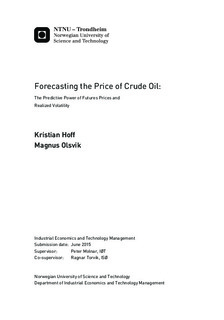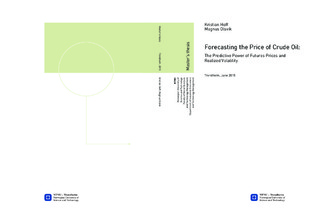Forecasting the Price of Crude Oil: - The Predictive Power of Futures Prices and Realized Volatility
| dc.contributor.advisor | Molnar, Peter | |
| dc.contributor.advisor | Torvik, Ragnar | |
| dc.contributor.author | Olsvik, Magnus | |
| dc.contributor.author | Hoff, Kristian | |
| dc.date.accessioned | 2015-10-06T11:29:51Z | |
| dc.date.available | 2015-10-06T11:29:51Z | |
| dc.date.created | 2015-06-04 | |
| dc.date.issued | 2015 | |
| dc.identifier | ntnudaim:12668 | |
| dc.identifier.uri | http://hdl.handle.net/11250/2352919 | |
| dc.description.abstract | This paper studies the predictability of the crude oil spot price using futures prices and realized volatility of spot prices. Over the short-term, the simple no-change forecast works better than forecasts based on futures prices. Across long-term horizons futures-based forecasts perform better. Both these types of forecasts, the simple no-change forecast and forecasts based on futures prices, can be improved by incorporating realized volatility as an additional predictor. Moreover, realized volatility can also predict changes in futures prices. Altogether, realized volatility plays an important role in forecasting oil prices. | |
| dc.language | eng | |
| dc.publisher | NTNU | |
| dc.subject | Industriell økonomi og teknologiledelse | |
| dc.title | Forecasting the Price of Crude Oil: - The Predictive Power of Futures Prices and Realized Volatility | |
| dc.type | Master thesis | |
| dc.source.pagenumber | 36 |

